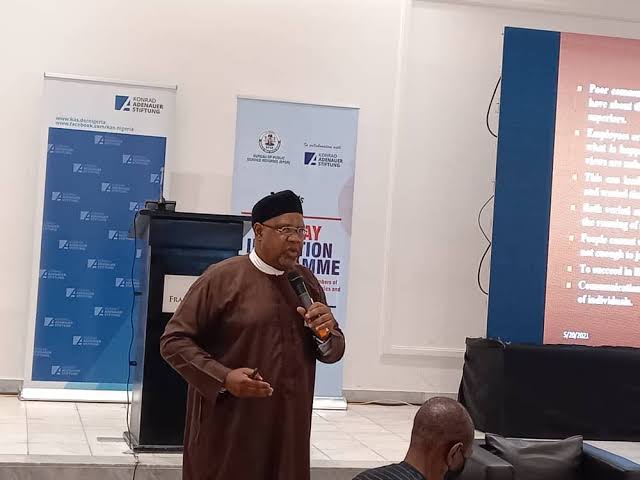By Alhassan Hassan Salihu
Few men leave a mark on society without holding office, wearing a uniform, or carrying authority. Bala muhammad is not just a media scholar; he is a guardian of culture, discipline, and an architect to greatness.
In the early 2000s, Kano’s streets were alive with sound and color. Markets bustled, commercial tricycles darted through traffic, and the rhythm of daily life carried on as it had for generations. But beneath the energy, a different reality was taking shape, one of disorder.
Road signs were ignored. Tricycle drivers cut across lanes at will. Pedestrians crossed wherever they pleased. Public order, once a matter of pride, seemed to be slipping away.
A renowned but marked by growing disorder, congestion, and a fragile sense of control that hinted at deeper challenges ahead.
It was in this climate that a quiet movement began, not through the force of law or the threat of arrest, but through the power of a voice. That voice belonged to Bala Muhammad.
A respected media scholar, newspaper columnist, and familiar voice on radio, Bala had built a reputation for reasoned, honest commentary. People trusted him because he spoke plainly. He explained ideas without lecturing, and he criticised without insulting.
When the Kano State Government launched a programme called Adaidaita Sahu meaning “straighten the public order” in Hausa, its goal was to restore discipline and order in public life. Many regarded it as another government slogan that would soon fade away.
Bala saw something else, to him, “Adaidaita Sahu” was not just a policy; it was a chance to change the city’s mindset.
He took to the airwaves, writing and speaking about the programme in a way the public could connect with. His columns carried titles like “DISCIPLINE AS A WAY OF LIFE”, “THE ORDERLINESS WE LOST”, and “ADAIDAITA SAHU: OUR CULTURAL RETURN.”
But instead of listing rules, he told stories. He spoke of a time when people queued without being told, when elders were given seats on buses without asking, when the street belonged to everyone, not only to the loudest or most aggressive.
His message was clear: public order was not something foreign. It was part of Hausa culture and it was Islamic. It was part of the city’s heritage.
Bala’s campaign was not limited to print and broadcast. He visited mosques, speaking after Friday prayers. He went to motor parks, markets, and universities. Everywhere he went, his refrain was the same: “Adaidaita Sahu is not politics. It is a mirror showing us what we are supposed to be.”
At first, some thought he was being idealistic. But slowly, change began to appear; Tricycle drivers started queueing properly at parks, street vendors kept their stalls cleaner.
Schools invited him to speak to students about discipline and respect. These changes were not the result of fines or enforcement. They came because people were reminded of their own values.
Bala’s approach was simple but powerful: show’s people that discipline is not an enemy of freedom, but the framework that makes freedom possible.
Over time, the city’s atmosphere began to shift. Kano remained vibrant, but there was less chaos. The Adaidaita Sahu movement grew into one of the most ambitious civic initiatives in the state’s history.
Its real success, however, was not in official reports, but in the everyday behaviour of ordinary people!
Bala Muhammad had no power to arrest, fine, or shut down businesses. All he had was a pen, a microphone, and an unshakable belief that people could rise to a higher standard when reminded of their shared culture and faith.
That belief proved stronger than any law.
By the height of the movement, Bala was more than a commentator. He had become a trusted voice in Kano, a voice that seemed to walk alongside people on the streets, even when he was not physically there.
Adaidaita Sahu’s story is proof that lasting change does not always begin with authority or force. Sometimes, it starts with one person speaking to the hearts of the people, telling them that they already have what it takes to live better.
Years later, many still recall the movement. Some remember the radio programmes. Others remember hearing Dr. Bala at their local mosque or market. Still others remember reading his words in the newspaper and feeling proud of their city again.
His legacy is a reminder that you can write laws, but without public belief, they remain words on paper. True order comes when people take ownership of it.
Kano in the early 2000s was noisy, restless, and often chaotic. The city’s energy was undeniable, but it lacked direction, with disorder slowly eroding its social fabric. It was during this period that Dr. Bala, through patience, wisdom, and unwavering conviction, helped the city rediscover a sense of balance. He guided it back to a rhythm rooted in respect, discipline, and communal harmony, restoring hope and dignity to everyday life.
Not with force, Not with fear, but with faith; faith that the people of Kano could remember who they were, and live up to it.
Let’s do it again!!!
Bala muhammad showed that respect, patience, and order were not Western imports, they were Hausa values, Islamic values, rooted in our identity.
He’s not just a man of letters; he is a man of legacy, who turned words into movement, and movement into memory.


